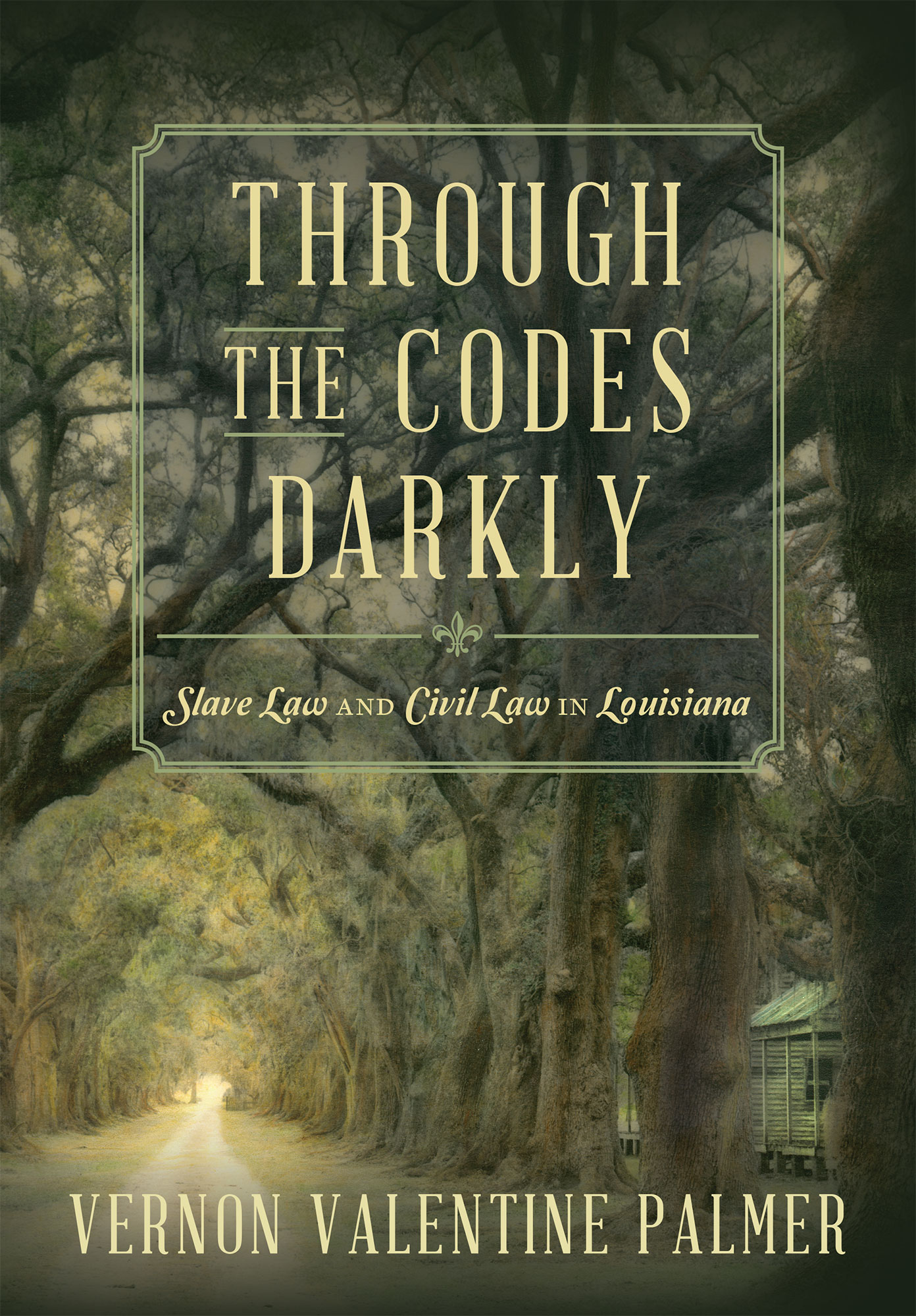JUST PUBLISHED
Vernon Valentine Palmer,
Through the Codes Darkly:
Slave Law and Civil Law in Louisiana
xvi,
196 pp. Hardcover $59.95. ISBN 9781616193119;
Paperback $49.95
ISBN 9781616193263.
This fascinating study offers:

• an examination of the complex French, Spanish, Roman and American heritage of Louisiana’s law of slavery and its codification
• a profile of the first effort in modern history to integrate slavery into a European-style civil code, the 1808 Digest
• a trailblazing study of the unwritten laws of slavery and the legal impact of customs and practices developing outside of the Codes
• an analysis that overturns the previous scholarly view that Roman law was the model for the Code Noir (1685)
• a new unabridged translation (by Palmer) of the revised Code Noir (1724) with the original French text on facing pages.
• a trailblazing study of the unwritten laws of slavery and the legal impact of customs and practices developing outside of the Codes
• an analysis that overturns the previous scholarly view that Roman law was the model for the Code Noir (1685)
• a new unabridged translation (by Palmer) of the revised Code Noir (1724) with the original French text on facing pages.
VERNON VALENTINE PALMER is the Thomas Pickles Professor of Law and
Co-Director of the Eason Weinmann Center for Comparative Law at Tulane
University. He has written more than forty books and articles, including
Mixed Jurisdictions Worldwide: The Third Legal Family, Mixed
Jurisdictions Compared: The Private Law of Louisiana and Scotland
(coedited with Elspeth Reid) and The Louisiana Civilian Experience:
Critiques of Codification in a Mixed Jurisdiction.
When it comes to demystifying slave law in Louisiana, Vernon Palmer is practically peerless. It’s probably because he is
equally comfortable in the weeds of lived experience as he is poring over
the pages of classical learning. These masterful essays on the Code
Noir’s origins, plus Louisiana’s
150-year interplay between custom and legal practice, belong on the shelf of anyone with the faintest
curiosity about human bondage and the laws fashioned to make it work.
Lawrence Powell
Professor Emeritus, Department of History, Tulane University
Slavery remains a current social and political
problem, and Vernon Palmer’s brilliant work illuminates its history,
showing its legal and social complexity through a study primarily of Louisiana, where slavery was included in the first civil codes.
Beautifully written, humane and insightful, this monograph will
promote reflection on the fascinating legal history of Louisiana as well as on the famous Tannenbaum thesis.
John W. Cairns, FRSE
Chair of Legal History, University of Edinburgh
Palmer has written a path-breaking and splendid
account of how Louisianians, newly under American rule, wrote the fi
rst modern codes that incorporated slavery in a systematic way
into their civil law. Until now, ignored by scholars, these codifi
cations moved slavery from the edges of the legal system to the very
center stage in Louisiana courtrooms.
Judith Kelleher Schafer
author of Slavery, the Civil Law and the Supreme Court
of Louisiana and
Becoming Free, Remaining Free: Manumission and
Enslavement in New Orleans,
1846–1862
Vernon V. Palmer’s probing investigation into the
world of an unexpected series of French lawmakers offers a new and
insightful response. This book is a must read for anyone
interested in the French legacy of slavery and law in the Americas.
Jean M. Hébrard
Ecole des Hautes Etudes en
Sciences Sociales, Paris
This elegantly written book will take a prime place
among those that should be consulted on the institution of slavery
and its lasting imprint on Louisiana.
Professor Palmer’s important new book clarifies the subject of Louisiana slave law. Palmer’s comprehensive English translation of colonial Louisiana’s Code Noir of 1724 will be particularly useful to researchers. A practical
feature is a timeline outlining the progression of slave law from colonial
times through the end of slavery in Louisiana.
Georgia Chadwick
Director, Law Library of Louisiana
This comprehensive study analyzes the successive legal
codes that framed life under slavery as the result of dynamic
interactions among custom, doctrine, and experience. Professor Palmer
makes it clear that the drafting and evolution of these codes reveals
key structures of power and presumption, continually confronted by
challenges to such formal rules by masters and by slaves themselves.
Rebecca J. Scott
co-author of Freedom Papers:
An Atlantic Odyssey in the Age of Emancipation

No comments:
Post a Comment
Note: Only a member of this blog may post a comment.